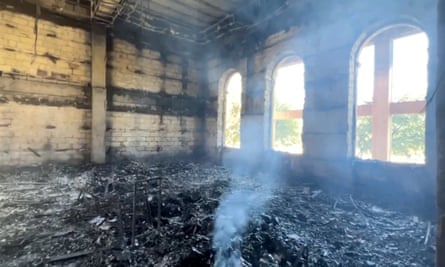Dagestan attack highlights Russia’s Islamist terror threat amid Ukraine war
Sunday’s terrorist attack in Dagestan that left at least 19 people dead has highlighted Russia’s growing difficulties in managing a tide of Islamist terror at home as its security forces are engaged in the war in Ukraine.
The attack, which was carried out by four gunmen in the capital, Makhachkala, and two in the seaside city of Derbent, appeared to catch Dagestani officials by surprise. At least 15 police officers were among those killed, and the attackers also burned down a synagogue and set fire to a church in acts that Russian officials are clearly concerned could lead to a tide of inter-ethnic violence at home.
The mostly Muslim region in the North Caucasus in southern Russia is one of the country’s most restive, and the growing social unrest and violence there could indicate that the Kremlin is struggling to maintain order at home amid Vladimir Putin’s singular focus on his generational conflict with the west.
The violent attacks, which included a drive-by shooting of traffic police, were reminiscent of the regular terror attacks that plagued the city in the 2000s. No group has taken responsibility but analysts have suggested that it appears tied to Islamic State’s North Caucasus branch, Vilayat Kavkaz.
Coming just months after the Moscow concert hall attack, where IS-linked militants killed 145 people, and last year’s antisemitic rioting at the Dagestan airport, the new attacks will raise concerns about a growing pool of radicalised young people in Russia and in particular in the North Caucasus, where societal tensions on multiple fronts appear close to a boiling point.

Valentina Matviyenko, the head of Russia’s Federation Council, called for residents of Russia and Dagestan to “demonstrate their maturity and avoid an emotional reaction, despite the enormity of what happened. Not to take the easiest, wrong path of escalation of inter-ethnic and inter-religious tensions and animosity.”
To prevent that from happening, Russian officials quickly moved to try to portray the attack as a “provocation” by outside forces, including the US and the Nato military alliance, despite ample evidence of homegrown terrorism in Russia stemming back to the devastating wars of the 1990s in the North Caucasus.
“Of course, we understand who is behind the organisation of these terrorist attacks,” said Sergey Melikov, the head of Dagestan. “We understand what the organisers were trying to achieve,” he said, and claimed that sleeper cells had “certainly been prepared, including from abroad”.
Two of the attackers were reported to be sons of the head of Dagestan’s Sergokalinsky district, Magomed Omarov, who was detained for questioning. His records have been removed from the site of United Russia, the country’s ruling party, of which he was a member. Russian media reports on Monday said he had told investigators that he knew several members of his family had been radicalised years earlier, and the identities of a number of the assailants were known to police in advance.
Dagestan, a mostly Muslim republic in southern Russia with a diverse population, high levels of unemployment and struggles with Islamist radicalism, has long been one of Russia’s most turbulent regions. It was the site of protests against mobilisation for the war in Ukraine in 2022 and was one of Russia’s hardest hit regions during the Covid crisis of 2020.
after newsletter promotion
The clearest sign of the social turmoil was an antisemitic mob directed by social media that stormed the Makhachkala airport last October in search of Jewish passengers arriving from Israel.
Video posted on social media showed hundreds of young men, some carrying Palestinian flags or placards denouncing Israel, storming on to the tarmac and climbing on to idling planes, attempting to break through the windows.
Mobs in several cities also besieged hotels after telling the owners that they believed they were sheltering Jewish guests inside.